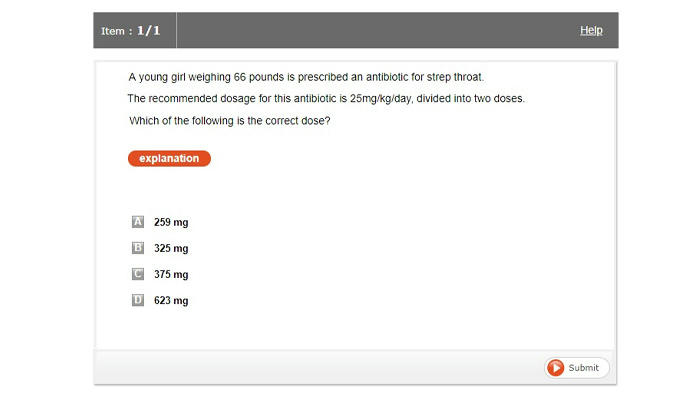Your Guide to the Pharmacy Technician Certification Exam (PTCE)

Back in 1995, the American Pharmacists Association introduced the Pharmacy Technician Certification Board Certification Exam (PTCE). This exam is crucial for anyone aiming to become a Certified Pharmacy Technician (CPhT) in the U.S. It's like your backstage pass to the pharmacy world, available year-round at testing centers nationwide.
This exam is available year-round at various locations throughout the United States. Successful candidates receive their certification after a waiting period of six to eight weeks, along with a certificate and wallet card valid for two years. Achieving certification requires rigorous preparation and a thorough understanding of the exam's structure and content.
1.Exam Structure and Scoring

The Pharmacy Technician Certification Exam (PTCE) is meticulously designed to evaluate candidates' proficiency across 90 multiple-choice questions, of which 10 are pre-test questions used for statistical analysis and not included in the final score. These questions are strategically divided into three principal domains, each crucial for pharmacy technician roles:
Patient Service (66% of the exam)
This section assesses candidates' ability in areas such as data processing, communication with patients and healthcare providers, and handling third-party payers. It focuses on ensuring effective patient care and service delivery within a pharmacy setting.
Medication and Inventory Control (22% of the exam)
This category tests candidates on their knowledge of medication supply management, including identifying drugs, maintaining inventory records, and adhering to quality control standards. Competence in this area is vital for ensuring accurate dispensing and inventory management practices.
Administration and Management (12% of the exam)
Covering topics like safety practices, federal regulations, professional standards, quality assurance, and billing procedures, this domain evaluates candidates' understanding of operational and regulatory aspects within a pharmacy. Mastery in administration and management is essential for ensuring compliance and operational efficiency.
To pass the PTCE, candidates must achieve a minimum score of 1400 out of 1600. They are allowed a maximum of four attempts to pass the exam. Failing more than four times results in ineligibility for further attempts, highlighting the importance of thorough preparation and strategic study. Understanding these detailed specifications enables candidates to focus their study efforts effectively, ensuring they are well-prepared to meet the rigorous standards required to become Certified Pharmacy Technicians (CPhTs).
2.Preparation and Study Tips for the PTCE
Thorough Subject Mastery
Achieving success in the Pharmacy Technician Certification Exam (PTCE) begins with mastering key subjects. Focus on understanding pharmaceutical calculations, pharmacology, pharmacy law, and medication safety protocols. These foundational areas are essential for building a strong knowledge base and preparing comprehensively for the exam.
Practical Application Focus
Beyond memorization, practical application is key. Practice applying pharmaceutical calculations, understanding drug interactions, and adhering to legal and safety guidelines in pharmacy practice settings. This hands-on approach reinforces your understanding and prepares you to handle diverse situations effectively.
Effective Time Management
Time management is critical during the PTCE. With 90 multiple-choice questions to answer in two hours, allocate approximately one minute and thirty seconds per question. Prioritize easier questions first to ensure you maximize your score potential while leaving adequate time for more challenging ones.
Utilization of Practice Resources
Utilize practice exams and targeted review courses extensively. These resources simulate the PTCE format, refine your test-taking strategies, and identify areas for improvement. Familiarize yourself with the exam's computerized interface and use of tools like calculators to navigate smoothly on exam day.
3.Exam Day Experience
On exam day, the Pharmacy Technician Certification Exam (PTCE) is administered in a computerized format and conducted online for convenience and accessibility. Candidates receive their scores immediately after completing the exam, obtaining an unofficial score report at the conclusion of the test session. This allows them to gauge their performance promptly.
Following the exam, the official scores are posted online approximately two weeks later. This brief waiting period facilitates the resolution of any disputed questions or issues that may arise during the exam process. This structured approach ensures transparency and fairness in the evaluation of candidates' knowledge and skills, enhancing the overall credibility of the PTCE as a benchmark for pharmacy technician certification.
4.Benefits of PTCE Certification

Obtaining Pharmacy Technician Certification Board Certification (PTCB) through the PTCE opens numerous professional opportunities and benefits. Certified Pharmacy Technicians (CPhTs) enjoy enhanced career prospects, job security, and potential salary increases.
Career Opportunities
PTCE certification significantly expands career options for pharmacy technicians. Certified professionals are preferred by employers across various healthcare settings, including hospitals, retail pharmacies, long-term care facilities, and pharmaceutical companies. The certification validates their competence and commitment to quality patient care, making them valuable assets in the healthcare industry.
Job Prospects
With the healthcare industry experiencing continuous growth, the demand for qualified pharmacy technicians is robust. PTCE certification distinguishes candidates in a competitive job market, increasing their chances of securing employment and advancing their careers. Employers often prioritize certified technicians due to their proven knowledge and skills, which align with industry standards and regulatory requirements.
Salary Increases
Certified pharmacy technicians typically earn higher salaries compared to their non-certified counterparts. The certification demonstrates proficiency in pharmaceutical knowledge, patient safety, and ethical standards, contributing to enhanced job performance and employer confidence. As a result, certified technicians may negotiate higher starting salaries, performance-based raises, or promotions within their organizations.
Overall, PTCE certification not only validates a pharmacy technician's expertise but also positions them for long-term career success and professional growth in the dynamic healthcare field.
